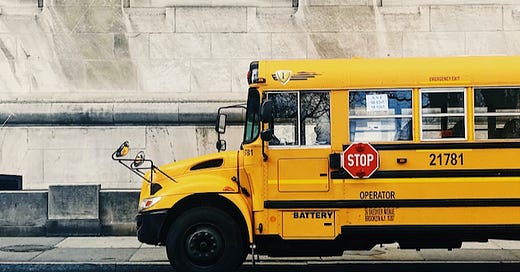Here we are again, the morning after an unconscionable school shooting. My daughter is almost 9, and it’s hard for me to even read about what happened — I cannot possibly imagine living it. I cannot imagine the heartbreak and loss that the parents of those three precious children are suffering today. And the worst of it is that it didn’t have to be this way. We’ve had so many chances to make things better. But our politicians keep making terrible choices.

I got back home late on Sunday night from the biennial conference for the Society for Research in Child Development, so I’ve spent the entire weekend thinking about science and what it can do for us. Over the past 17 years, I’ve reported on many issues within the larger social science umbrella, including gun violence. I’ve written about the science showing that, despite what Marjorie Taylor Greene claimed today, “good guys with guns” do not keep people safe from gun violence. I’ve also covered specific gun laws that have been shown to save lives. And I’ve explored the psychology of why white American men are so tied to their guns.
Many people ignore or even decry this kind of research, arguing that social science is flawed, biased, not to be trusted. One of my most unsavory experiences this past weekend involved a brief conversation with a bartender at a hotel bar. After I said I was attending a developmental psychology conference, he said to me, “So what do you think about the fact that scientists are so biased?” I could tell from his tone that he had an established opinion on the matter and no interest in changing it, so I kept my answer short and sweet: “Well, everyone is biased, because we’re all human.”
When I got back to my hotel room, I realized that what I really should have said was this: “Everyone is biased, because we’re all human — but science is less prone to bias than pretty much any other human endeavor.” The scientific method is built around the understanding that people have biases, but that there are steps we can take to at least partially overcome them.
This doesn’t mean that science is always accurate or objective, by any means. But it is the best damned tool we have for slowly whittling away at the truth — including uncovering why the world is the way it is and what we can do to make it better. Science can help us understand how to address the many societal problems that plague us: Gun violence, racism, sexism, polarization, and irrational thinking, to name but a few.
The first step is to understand how, why and when we as humans develop the many biases and tendencies that get us into trouble, and this is precisely what child psychologists do every day. This weekend, I heard dozens of researchers share their careful and thoughtful attempts to disentangle the roots of various predilections and prejudices.
Were these researchers dogmatic? Unwilling to hear contradictory opinions? Quite the opposite: They openly discussed the limitations of their research and welcomed constructive criticism. I can’t count the number of times I heard a psychologist say something like, “That’s a really good point — we’ll try to design an experiment in the future that can tease that out.”
Of course, understanding the roots of our societal woes is just the first step. The next is to dig into what might interrupt them early in life and coax humanity in a better direction — and developmental psychologists study this, too. After years of reporting, I really do believe that science, and especially developmental science, holds the key to changing the world. This is why I wrote my book, and why I’m here every week, twice a week, talking about new research in the field. The more we can collectively learn from the science on how to raise kids to be empathetic, inclusive, intellectually humble, media literate and all the other wonderful things we aspire for our children to be, the closer we are to building a future that is not constantly interrupted by heartbreak and violence.
For those of you wondering how to talk with your kids about the Nashville tragedy, this newsletter I wrote might be helpful to you. I have also written about bulletproof backpacks and the four key things parents can do to keep kids safe from gun violence.
I also want to take a beat to thank my paid subscribers. You are the reason I’m able to dig into and share the research that I believe is so crucial to our future. I couldn’t do it without your financial support.






More research worth looking into that I wish more people knew about: The National Threat Assessment Center (NTAC; pronounced "En-Tac") has analyzed data from mass shootings for decade and have used their research to develop a framework for preventing mass attacks. Here's the report on averted mass attacks in schools: https://www.secretservice.gov/sites/default/files/reports/2021-03/USSS%20Averting%20Targeted%20School%20Violence.2021.03.pdf
Every time details emerge about shooters in the aftermath of violence, we learn that there were warning signs that were ignored or not properly addressed. There's discourse about who should be punished, how they should be punished, where the guns came from, what doors should have been locked, and on and on.
But what we don't often hear about is this NTAC research on ways communities can work together to prevent mass shootings.
I've already forwarded that Scientific American study to a lot of people. Thanks, Melinda. I am just devastated. Again.